Lesser known than its European counterparts, Japan is admired among footwear enthusiasts for its premium and elegant shoes. While its contemporary shoe industry is comparatively nascent, Japan has a celebrated history of high-end craftsmanship, rooted in the concept of shokunin—the master artisan’s relentless and devoted pursuit of perfection. This single idea is the thread that connects the high-tech cushioning in a pair of ASICS running shoes to the flawless hand-stitching on a bespoke Yohei Fukuda oxford.
Western-style leather shoes were only introduced to Japan in the late 19th century, during the Meiji era. This historical context is key; Japanese artisans didn’t invent the forms but instead dedicated themselves to deconstructing, understanding, and ultimately perfecting them. This unique cultural approach has created a footwear landscape of unparalleled depth and quality.
This guide is designed to be the most comprehensive resource available for the international enthusiast. We will journey through the entire spectrum of Japanese footwear, from the globally iconic sneakers that defined a nation’s style to the sublime, handcrafted dress shoes that represent the pinnacle of the craft. We’ll also provide the essential, practical advice you need to purchase them from anywhere in the world.

Eiji Murata / “Main d’Or”
We independently choose the brands we feature on BespokeUnit. If you purchase through our links, we may earn a commission at no extra cost to you.
What Are The Best Japanese Shoe Brands For Men?
| Shoe Manufacturer | Known For | Quick Link |
|---|---|---|
| 1. Onitsuka Tiger Heritage Sneaker, iconic Mexico 66 |
Timeless casual style, sneaker history | Shop Now |
| 2. ASICS Performance & Lifestyle Sneaker with GEL™ technology |
Athletes and tech-forward streetwear | Shop Now |
| 3. Mizuno Performance & Lifestyle Sneaker with deep sportswear roots |
Japan-exclusive models and athletic innovation | Shop Now |
| 4. Hender Scheme Artisanal leather footwear, Manual Industrial Products (MIP) line |
Reimagined sneaker silhouettes in raw, patinating leather | Shop Now |
| 5. Visvim Cult Menswear |
Rugged yet refined footwear from a cult-favorite menswear label | Shop Now |
| 6. Suicoke Contemporary utilitarian sandals |
Fashion-forward comfort and high-profile collaborations | Shop Now |
| 7. Hiro Yanagimachi Bespoke, MTM, & MTO |
“Invisible” quality, flawless pattern execution | Visit Website |
| 8. TYE Shoemaker Bespoke only |
Highly exclusive, traditional bespoke footwear | Learn More |
| 9. Yohei Fukuda Bespoke & MTO |
English-inspired style with Japanese precision | Visit Website |
| 10. Eiji Murata [Main d’Or] Bespoke Only |
The ultimate one-man workshop; painstaking detail | Learn More |
| 11. 42nd Royal Highland Ready-to-Wear Only |
Elegant Goodyear-welted shoes with English heritage inspiration | Visit Website |
| 12. Shoji & Yuriko Kawaguchi [Marquess] Bespoke Only |
Inspired by early 20th Century English footwear | Learn More |
| 13. Union Royal Ready-to-Wear Only |
One of Japan’s oldest shoemakers; varied construction | Visit Website |
| 14. Scotch Grain Ready-to-Wear Only |
Affordable entry for quality Goodyear-welted shoes | Visit Website |
| 15. Rendo Shoes Ready-to-Wear Only |
Well-balanced and comfortable shoes from custom molds | Visit Website |
| 16. Miyagi Kogyo16
MTO & RTW |
Best value proposition in high-end Japanese footwear | Visit Website |
Part 1: The Icons – Heritage & Lifestyle Sneakers
This section covers the brands that have become global ambassadors for Japanese footwear, capturing the largest audience and serving as the perfect entry point into this rich landscape.
Onitsuka Tiger
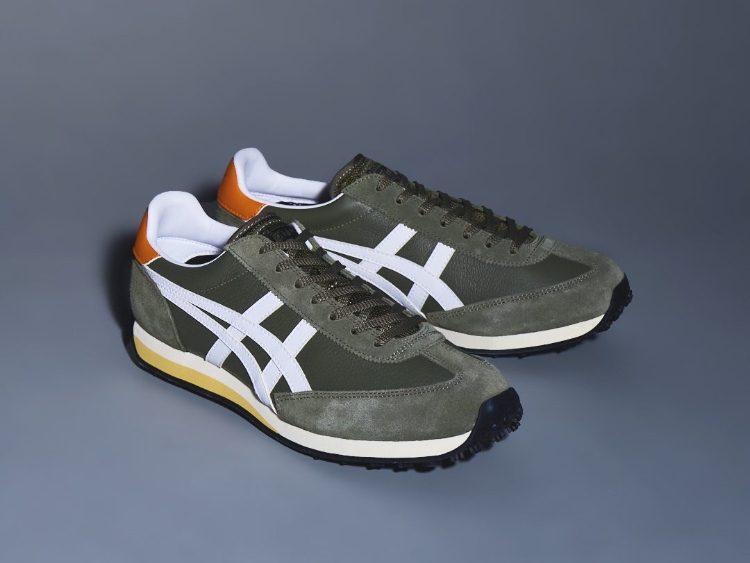
- Category: Heritage Sneaker
- Hallmarks: Mexico 66, “Nippon Made” Collection
- Price: $$
Why We Chose It
Onitsuka Tiger is one of the oldest and most influential shoe companies in Japan, representing the genesis of the modern sneaker industry.
Founded in Kobe in 1949 by Kihachiro Onitsuka, the brand’s mission was to create athletic footwear for the nation’s postwar youth. Its most iconic model, the Mexico 66, is a globally recognized classic, further immortalized by its appearance in the film Kill Bill.
For the true enthusiast, the brand’s “Nippon Made” collection is a must-know. This premium line showcases the pinnacle of Japanese craftsmanship, with each pair being handcrafted in a factory in Tottori Prefecture. The attention to detail, from the stitching to the dyeing, results in a product of superior quality and timeless beauty.
ASICS
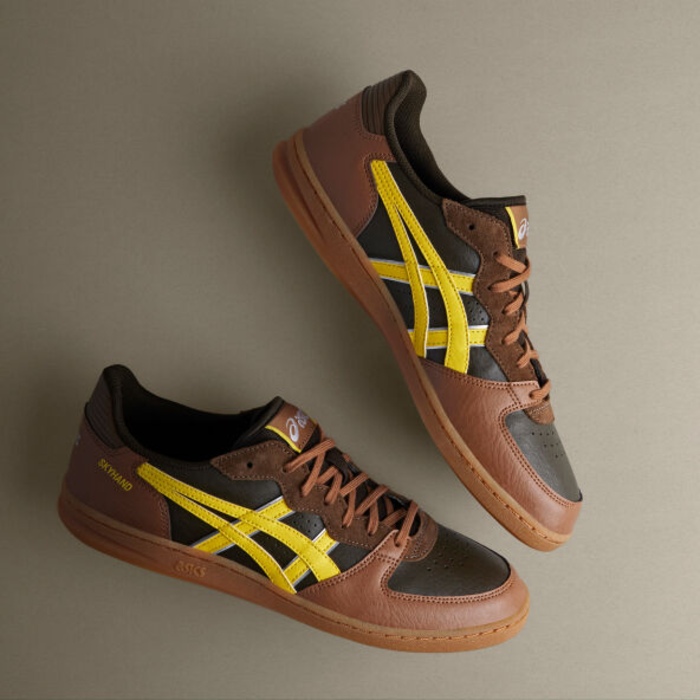
ASICS Skyhand OG
- Category: Performance & Lifestyle Sneaker
- Hallmarks: GEL Cushioning Technology
- Price: $$-$$$
Why We Chose It
ASICS evolved from Onitsuka Tiger in 1977, its name an acronym for the Latin phrase Anima Sana In Corpore Sano (“a healthy soul in a healthy body”). This philosophy drives the brand’s dual identity.
ASICS is a dominant force in technical performance footwear, particularly running shoes, thanks to its signature GEL technology. Simultaneously, the brand is a giant in the lifestyle market with classic silhouettes like the GEL-LYTE III.
For those visiting Japan, it’s worth seeking out their high-quality dress shoe line. This line integrates sneaker-level comfort into business-appropriate footwear and is primarily available in the domestic market.
Mizuno
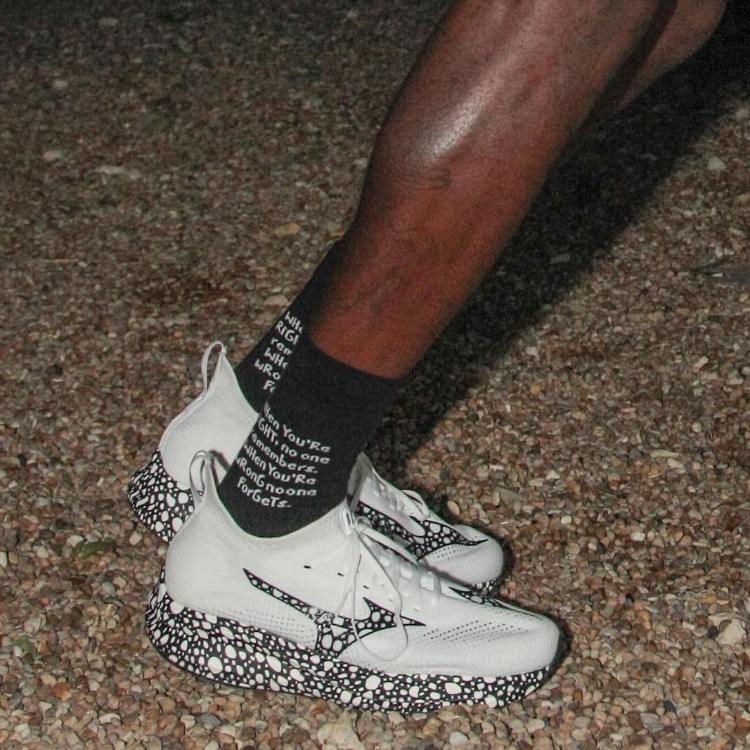
- Category: Performance & Lifestyle Sneaker
- Hallmarks: Deep roots in technical sportswear
- Price: $$-$$$
Why We Chose It
With a history dating back to 1906, Mizuno is a pillar of the Japanese sportswear industry, renowned for its expertise in baseball and running gear.
While a major global brand, Mizuno often releases Japan-exclusive models that are highly sought after by collectors and enthusiasts looking for unique designs not available internationally.
Part 2: The Innovators – Contemporary Design & Streetwear
This category of Japanese footwear is for the fashion-forward consumer, highlighting the brands that are pushing boundaries and defining modern Japanese style.
Hender Scheme

- Category: Artisanal Leather Footwear
- Hallmarks: Manual Industrial Products (MIP)
- Price: $$$$
Why We Chose It
Hender Scheme, founded by Ryo Kashiwazaki, brilliantly juxtaposes traditional Japanese leather craftsmanship (shokunin) with iconic, mass-market sneaker designs.
The brand is most famous for its “Manual Industrial Products” (MIP) line, where classic sneakers are deconstructed and meticulously recreated by hand in raw, untreated leather.
This natural leather is designed to develop a unique patina over time, making each pair a personal, evolving reflection of its owner. This concept resonates deeply with connoisseurs of quality goods.
Visvim

- Category: Cult Menswear
- Hallmarks: Fusion of Japanese craft and vintage Americana
- Price: $$$$$
Why We Chose It
Visvim is more than a shoe brand; it’s a cult-favorite menswear label founded by the influential Hiroki Nakamura.
The brand’s aesthetic is a unique and compelling fusion of artisanal Japanese production methods, natural materials, and design cues from vintage Americana. The resulting footwear is rugged yet refined, making it a staple for discerning wardrobes worldwide.
Suicoke
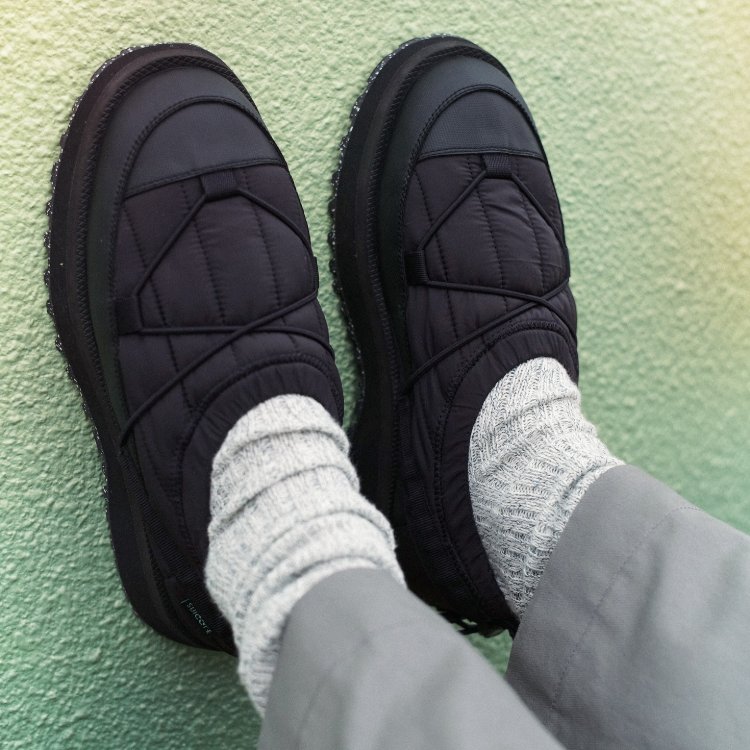
- Category: Contemporary Sandal
- Hallmarks:Utilitarian design and high-fashion collaborations
- Price: $$
Why We Chose It
Suicoke has rapidly become a key player in the luxury and utilitarian sandal trend.
Known for robust construction, comfortable Vibram soles, and distinctive nylon straps, the brand has cultivated a global cult following.
Its status has been further cemented through high-profile collaborations with fashion houses like Moncler and heritage brands such as Dr. Martens, making it a go-to for fashion-forward comfort.
Part 3: The Artisans – The Pinnacle of Dress Shoes & Boots
Here, we enter the world of sartorial excellence. This is where Japan’s master cordwainers create functional works of art, demonstrating the profound depth of the nation’s craft.
The Masters of Bespoke
This is the highest echelon of the craft, where shoes are not merely made but brought into existence through hundreds of hours of meticulous labor.
Hiro Yanagimachi

- Services: Bespoke, MTM, MTO
- Hallmarks: “Invisible” quality and flawless pattern execution
- Price:$2,300 – $4,150
Why We Chose It
A graduate of London’s prestigious Cordwainers College, Hiro Yanagimachi is a pioneer of the modern Japanese bespoke scene.
His philosophy centers on “invisible” quality—the perfection of details that are felt by the wearer rather than seen by the observer.
He is renowned for his “next-level handstitching” and perfect pattern execution, making his workshop a destination for those who appreciate the subtle art of true mastery.
TYE Shoemaker

- Services: Bespoke only
- Hallmarks: English-inspired style with Japanese precision
- Price:$3,000+
Why We Chose It
Following his training under Chihiro Yamaguchi at the Guild of Crafts, Tsuyoshi Ohno founded TYE in 2011.
Manufacturing only bespoke shoes, he currently works with just one other artisan who closes and makes patterns.
A traditional craftsman operating from his workshop in Taito City, prices for his highly exclusive bespoke footwear begin at around $3,000.
Yohei Fukuda

Why We Chose It
Before returning to Japan, Yohei Fukuda trained with reputed English shoemakers John Lobb, Gaziano Girling, and George Cleverley.
Although working almost exclusively for Hong Kong’s renowned haberdashers, The Armoury, Mr. Fukuda can also be contacted directly.
Otherwise, his bespoke service is available in Hong Kong while his made-to-order shoes can be also purchased at The Armoury’s New York Store.
Eiji Murata [Main d’Or]

- Services:Bespoke Only
- Hallmarks:The ultimate one-man workshop
- Price: $$$$$
Why We Chose It
A second generation shoemaker, Eiji Murata follows in his father’s footsteps who was a pattern maker in Tokyo. He initially started training at the Esperanza Institute of Footwear Design & Technique. Interestingly, this is where Chihiro Yamaguchi taught before founding his Guild of Crafts.
Before establishing Main d’Or (“golden hand” in French) in 2011, he studied at Fusao Kagami’s Kagami Shoemaking School.
Mr. Murata undertakes every single part of the manufacturing process by himself, which is a feat in itself to say the least. Given that they require 150 hours of work each, his bespoke shoes may require 18 months before they are completed. As a result, he only crafts 15 pairs of shoes a year.
42nd Royal Highland

- Services: Ready-to-Wear Only
- Hallmarks: English-inspired GYW
- Price: $529+
Why We Chose It
Founded in the 1990s, 42nd Royal Highland is a 100% Japanese brand that was inspired by English shoe-making.
Seeking to incorporate England’s heritage into its craftsmanship, all of its footwear is made entirely in Japan by expert artisans. As a result, 42nd Royal Highland produces some of the most elegant Goodyear-welted shoes on the Japanese market.
Shoji & Yuriko Kawaguchi [Marquess]

- Services: Bespoke Only
- Hallmarks: Husband & Wife Team
- Price: $3,500
Why We Chose It
Operated by husband-and-wife team, Shoji and Yukiro Kawaguchi, Marquess shoes was established in 2011. Shoji and Yukiro first met in the United Kingdom during their studies at the London College of Fashion. After graduating, they both headed north and worked together at Paul Wilson
In 2006, Shoji spent the next few years working in Gaziano Girling’s bespoke shoe department. When the couple returned to Japan in 2008, Shoji continued freelancing for Tony Gaziano before they launched the brand.
Shoji and Yukiro craft their shoes from workshop that they set up in their own apartment. As both are passionate about 1900s fashion, their bespoke shoes are aesthetically and structurally inspired by early 20th Century English footwear.
Union Royal

- Services: Ready-to-Wear Only
- Hallmarks: Varied construction methods
- Price: From $450
Why We Chose It
Established as Union Shoes in 1952, the brand represents one of Japan’s oldest existing shoemakers. In 1958, the factory incorporated the McKay manufacturing. However, it has since adopted both Bologna and Goodyear welt constructions too.
Throughout the 1960s and 1970s, Union worked alongside premium European brands including Mallerie, Christian Dior, and Charles Jordan. In 2007, Union established a new factory in Kamagaya, Chiba, east of Tokyo.
Now known as Union Royal, the company introduced its own private brand, Union Imperial, in 2008. This exclusive range uses leathers imported from France’s celebrated Annonay as well as a unique style of Goodyear welt.
Scotch Grain

- Services: Ready-to-Wear Only
- Hallmarks: Affordable Entry Price
- Price: From $400
Why We Chose It
Scotch Grain was founded by a shoemaker from Tokyo’s Taito Ward in 1978. Starting as a mass production house, it employed cemented and McKay Blake stitch constructions. However, it quickly adopted Goodyear welting with a focus on quality.
Recently, Scotch Grain was recently awarded as one of the top 300 “Hardworking small enterprises and entrepreneur companies” by Japan’s Ministry of Economy, Trade, and Industry. Today, it continues to proudly operate from its original Sumida ward factory.
Rendo Shoes

- Services: Ready-to-Wear Only
- Hallmarks: Long-Standing, Respected Domestic Manufacturer
- Price: From $450
Why We Chose It
Working from a single atelier and shop in Asakusa, Tokyo, Rendo started as a project that began in 2013. A graduate of Cordwainers College in London, he attended the Tokyo Metropolitan Vocational Skills Development Center on his return.
Following his studies, he worked on patterns at Central Shoe Co. before touring and working in Europe in 2007. On his return, he continued working with patterns on a freelance basis while developing his own projects.
Today, Rendo manufactures shoes using moulds that were developed by the atelier based on foot measurement data to create and well-balanced and comfortable shoe.
Miyagi Kogyo

- Services: MTO, RTW
- Hallmarks: Based Outside Tokyo
- Price: From $500
Why We Chose It
Miyagi Kogyo is the only brand currently featured on this list that is not based in or near Tokyo. In fact, it was first established in Higashiyonban Town, Sendai City, in 1941 and operates from Nanyo, Yamagata, today.
A Northern establishment, it was one of the first to introduce Goodyear welting on an industrial level. By 1952, it was already upgrading its old machinery with modern technology.
Furthermore, Miyagi Kogyo has been working with Barker Shoes since 1969. It even secured the right to manufacture and sell shoes under the name of an English brand in Japan.
Focusing mainly on ready-to-wear shoes, Miyagi Kogyo also introduced a made-to-order custom service in 2004.
Part 4: The History & Soul of Japanese Shoemaking
Japanese Shoe-Making History
Until the late 19th Century, Western shoes were relatively unknown in Japan. A largely feudal society threatened by European colonization, Japan remained relatively isolated and protective of its culture.
It wasn’t until the Meiji era that the Japanese became curious about foreign fashion and dress alongside the wave of “Datsu-A Ron” Westernization.

Miyagi Kogyo Factory
When Japan grew into an Empire, it quickly modernized and adopted rapid industrialization. With it came railroads and land reform programs to prepare the country for extensive development. Meanwhile, 3,000 Westerners were hired to teach in the country’s new universal education system.
Needless to say, this Western influence and education would have a profound effect on Japan’s culture and heritage. General tastes began to evolve by incorporating Western values. However, Japan still managed to retain its own identity.
Textiles were one of Japan’s first industrialized sectors, shifting from a cottage industry to mechanized factories. In its early period, nearly two-thirds of yarn was imported. However, it was mostly produced domestically by the turn of the 20th Century.

Scotch Grain Workshop
Nevertheless, footwear was slow to become industrialized.
Until the 20th Century, only the elite wore imported Western shoes. Instead, the majority wore wooden Geta sandals or Zori flip-flops.
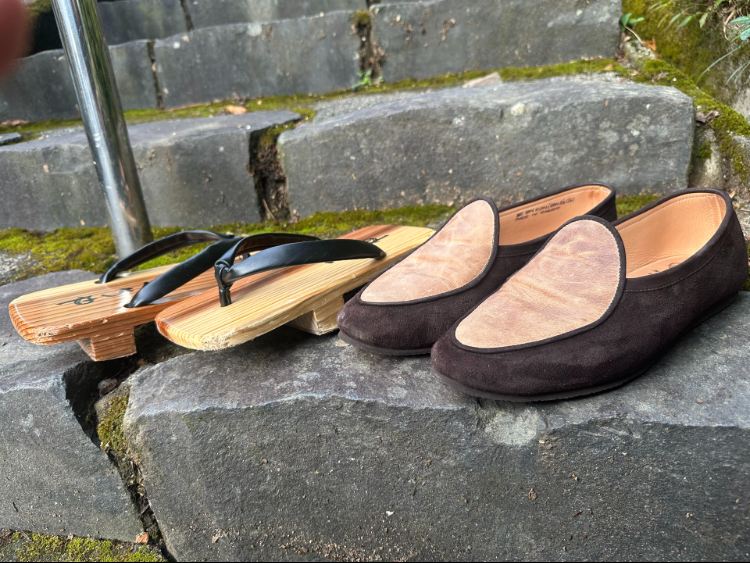
Crown Northampton Suede Slippers And Geta Wooden Sandals
By the mid-20th Century, a domestic shoe industry began to flourish. Overall, factories operated either near Tokyo or in the northern Yamagata and Miyagi provinces.
Indeed, Blake stitching and cemented constructions were often used for affordable shoes. However, the late industrialization period allowed most infrastructures to adopt Goodyear welting earlier in their development.
Japan’s Shoe-Making Industry Today

Marquess Shoes
Overall, Japan is a relatively new market for luxury footwear.
Demand really began to thrive in the early 2000s. Once an exclusively European tradition, bespoke shoe-making has recently flourished in Japan.
Interestingly, benchmade Goodyear-welted shoes are somewhat more expensive in Japan than in Europe. Meanwhile, bespoke shoes are comparatively affordable and quite competitive.
Nowadays, there are at least 40 bespoke shoemakers in Tokyo and perhaps nearly 100 throughout the entire country.
Until recently, most shoemakers were still obliged to train in Europe. However, a number of dedicated education centers have either been established in the last few years or have garnered critical acclaim.

Union Imperial Goodyear Welt
For instance, Kagami Shoemaking School, Chihiro Yamaguchi’s Guild of Crafts, and the Esperanza Institute of Footwear Design & Technique are dedicated to training Japan’s future shoemakers. In a true role reversal, many of Japan’s master shoemakers who began their careers in England now take on apprentices from Europe!

TYE Shoemaker Workshop
On one hand, this development is particularly surprising given that Japanese fashion tends to lean towards more casual styles.
After all, Japan is often associated with eclectic styles of Urban streetwear and the demand for allowing sneakers at the office is growing.
However, some argue that much of this gravitation towards casual styles is out of a desire for comfort. Therefore, it’s not surprising that the popularity of bespoke footwear has recently surged in Japan to such an extent.
Why Buy Japanese Shoes?
As shown above, Japan is often revered for its capacity to appropriate Western concepts and incorporate them into its cultural fiber. Furthermore, this is often achieved without compromising its own heritage and integrity.

Eiji Murata [Main d’Or] Shoes
Indeed, both of these characteristics are noticeably reflected in the finesse of their shoes. Influenced by English, Italian, or even French shoe-making, Japan’s cordwainers have certainly developed unique styles that are free from the traditional codes and conventions.
The results are often breathtaking and exquisite designs made with painstaking precision. Seeing Japanese shoe craftsmanship, it’s easy to realize why the once purely domestic market is growing in demand in the West.
Part 5: How to Buy Japanese Shoes: An International Guide
This is the most critical section for the international enthusiast. Many Japanese brands, from exclusive sneaker models to artisanal dress shoes, can be difficult to acquire from abroad. Here is your practical, step-by-step guide.

42nd Royal Highland Shoes
Option 1: Authorized International Retailers
The simplest method is to purchase from an official international stockist. This eliminates the complexities of language barriers and international shipping.
- Yohei Fukuda: Available at The Armoury.
- Miyagi Kogyo: Available at retailers like Skomaker Dagestad (Norway), Arthur Montreal (Canada), and Okayama Denim.
- Onitsuka Tiger / ASICS: Both have dedicated US and international webstores.
Option 2: Use a Japanese Proxy Buying Service
For Japan-exclusive items or brands that do not ship internationally, a proxy service is your essential tool. A proxy is a Japan-based company that purchases items on your behalf from local retailers and then ships them to you.
How It Works (The 4-Step Process):
- Find Your Item: Locate the product you want on a Japanese retail website (e.g., a brand’s official JP site, ZOZOTOWN, Rakuten).
- Submit the Order: Copy the item’s URL and submit it to your chosen proxy service.
- First Payment: The proxy service will confirm the item’s availability and provide a quote. You pay them for the cost of the item plus their service fee.
- Second Payment: The proxy purchases the item and has it delivered to their warehouse in Japan. You can then consolidate it with other purchases and pay for international shipping to your home address.
Recommended Proxy Services:
- Sendico: Noted for its generous 180 days of free warehouse storage and free package consolidation, which is excellent for combining multiple orders to save on shipping.
- Japan Rabbit: Offers a very detailed and transparent fee structure, so you know exactly what you’re paying for.
- Neokyo / Buyee: Known for direct integration with major Japanese e-commerce sites like ZOZOTOWN and Rakuten, making the process seamless.
What Next?
Now that you have read about the best Japanese shoe brands and their history, feel free to explore our other related guides:








There is good scope to develop shoe industry in Japan with Indian collaboration.